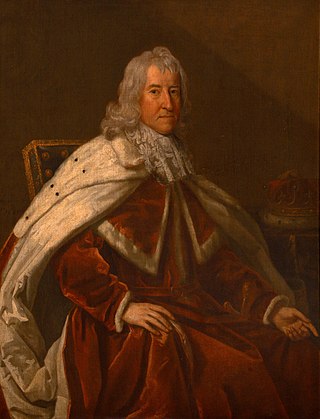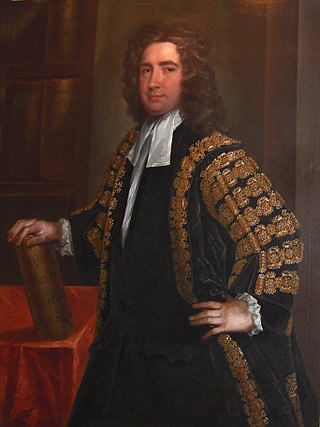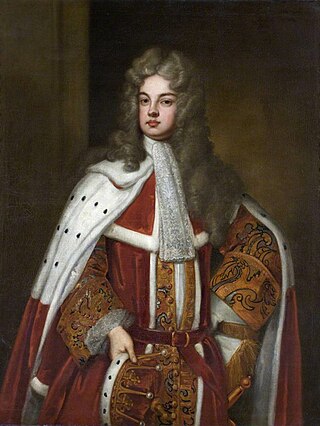
John Robartes, 1st Earl of Radnor was an English politician, peer and military officer who fought for the Parliamentary cause during the English Civil War. He retired from public life before the trial and execution of Charles I (1649) and did not take an active part in politics until after the Restoration in 1660. During the reign of Charles II he opposed the Cavalier party. Toward the end of his life he opposed the more extreme Protestant groups, led by Anthony Ashley Cooper, 1st Earl of Shaftesbury, who refused to accept the succession of James because he was a self-declared Catholic.

Earl of Radnor, of the County of Radnor, is a title which has been created twice. It was first created in the Peerage of England in 1679 for John Robartes, 2nd Baron Robartes, a notable political figure of the reign of Charles II. The earldom was created for a second time in the Peerage of Great Britain in 1765 for William Bouverie, 2nd Viscount Folkestone.

Earl Granville is a title that has been created twice, once in the Peerage of Great Britain and once in the Peerage of the United Kingdom. It is now held by members of the Leveson-Gower family.

Francis Blackburne PC (Ire) KS was an Irish judge and eventually became Lord Chancellor of Ireland.
There have been two baronetcies created for persons with the surname Hopkins, one in the Baronetage of Ireland and one in the Baronetage of the United Kingdom.

Thomas Carter PC was an Irish politician and MP who served as the Master of the Rolls, sat on the Privy Councillor and served as Secretary of State in Ireland. British nobleman and writer Horace Walpole described him as "an able and intriguing man".

George Montgomery (1562–1621) was a Scottish protestant cleric, promoted by King James VI and I to various Irish bishoprics. He held the offices of Rector of Chedzoy, Somerset; Dean of Norwich (1603); Bishop of Raphoe, Bishop of Clogher, Bishop of Derry (1605); and Bishop of Meath (1610).
Sir Tristram Beresford, 3rd Baronet was an Anglo-Irish soldier, politician and baronet.
Sir Randal Beresford, 2nd Baronet was an Anglo-Irish politician and baronet.

Charles Bodvile Robartes, 2nd Earl of Radnor (1660–1723) was an English politician who sat in the House of Commons from 1679 until 1681 and again in 1685 until he inherited a peerage as Earl of Radnor. He was styled Viscount Bodmin from 1682 to 1685.

William Stewart, 1st Viscount Mountjoy (1653–1692), was an Anglo-Irish soldier.
Sir Maziere Brady, 1st Baronet, PC (Ire) was an Irish judge, notable for his exceptionally long, though not particularly distinguished tenure as Lord Chancellor of Ireland.
The High Sheriff of Meath was the British Crown's judicial representative in County Meath, Ireland, from the conquest until 1922, when the office was abolished in the new Free State and replaced by the office of Meath County Sheriff.
Sir William Talbot, 3rd BaronetPC (Ire) was the last of the Talbot baronets of Carton: his title was forfeited on account of his loyalty to King James II of England. He was an Irish politician and judge, who served briefly as Master of the Rolls in Ireland.

Sir Courtenay Pole, 2nd Baronet (1619–1695), of Shute, Devon, was an English politician, who is best remembered as the sponsor of the hearth tax, which earned him the jeering nickname "Sir Chimney Pole".
Thomas Bladen (1615-1695) was an Anglo-Irish priest in the seventeenth century. The eldest son and heir of William Bladen of Newton Solney in South Derbyshire and Mary Young, his family left London in 1626 where they had a printing/bookselling business at St Paul's Churchyard to live amongst Protestant settlers in Dublin.
William Worth (c.1646–1721) was an Irish judge of the late seventeenth and early eighteenth centuries.
William Smyth was a seventeenth century Anglican bishop in Ireland. He was the ancestor of the prominent landowning family of Barbavilla Manor, Collinstown, County Westmeath.
Hercules Langford Rowley PC was an Irish politician and landowner.
Jenico Preston, 7th Viscount Gormanston, was an Irish peer, Jacobite soldier and landowner.








